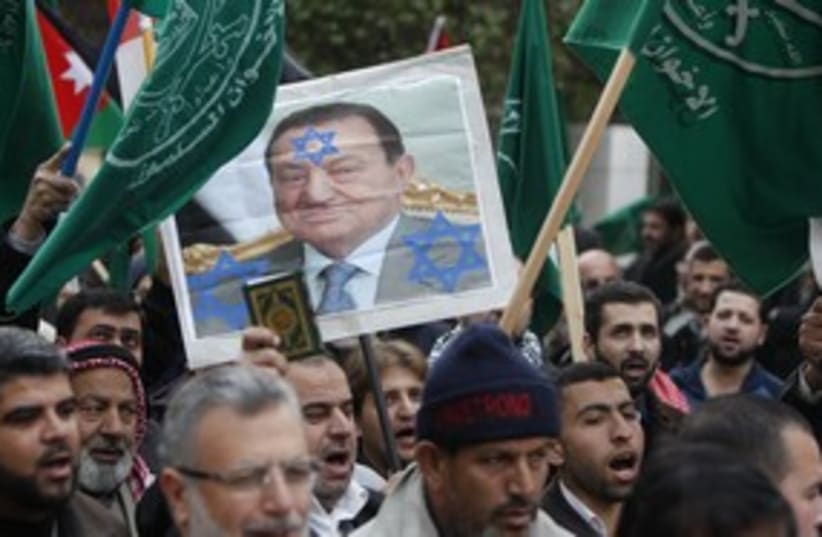Former CIA official Reuel Marc Gerecht estimated that in those elections, at least 20 percent to 25% of that vote would go to the Muslim Brotherhood, and could reach as high as 40%, likely making it the largest party to be represented in the parliament.But he and other experts who joined him at a forum on the Muslim Brotherhood convened by the Foundation for Defense of Democracies Monday said the actual effect the group had on the Egyptian government and policies would be affected by whether other parties banded together in opposition and how much power Brotherhood leaders themselves decided to seek.Out of all the murkiness, though, Gerecht said one point was clear: Israel and the US would be targets.“You will see the Brotherhood, without a shadow of a doubt, try to go after the United States whenever possible,” he predicted.“You will see them whenever possible [try] to go after Israel, to demonize Israel.”Gerecht pointed to the Egyptian-Israeli peace treaty as an all-but-certain object of their ire.“I think it’s highly likely the Muslim Brotherhood will push very hard for a review of the treaty with Israel,” he said, adding that since much of the secular elite also disliked Israel, “it is possible that you will see that treaty nullified.”But he noted the army would push back very hard against such a prospect, since it was so reliant on American funding that flowed from the treaty.Lorenzo Vidino, a RAND Corporation expert on Islamism and political violence who also participated in the FDD forum, explained that even if the Muslim Brotherhood did seek to have the treaty scrapped, it wasn’t looking for a clash with Israel for the time being.However, he did note that for all of the Muslim Brotherhood affiliates around the globe, with variances in their embrace of democracy, non-violence and political goals, the one constant was the chapters’ attitudes toward Hamas.“One point that brings them all together is their support for Hamas. That is the one issue on which they do not compromise,” he explained. “And it’s the one issue that has caused them a lot of problems, because that’s the one issue where they’ve been publicly supporting violent actions.”A third expert at Monday’s event, FDD’s director of the Center for Law and Counterterrorism Thomas Joscelyn, argued that whatever Muslim Brotherhood groups said about non-violence, their willingness to countenance suicide bombing revealed their true nature.He contended that while the organization might have declared an embrace of nonviolence for tactical purposes, “the idea that they’ve renounced violence as a whole, or jihad as a whole, is just completely false.”
'Egypt referendum may empower Muslim Brotherhood'
Former CIA official warns Islamic groups will seek to use power to scrap treaty with Israel, says US, Israel will be targets.

Former CIA official Reuel Marc Gerecht estimated that in those elections, at least 20 percent to 25% of that vote would go to the Muslim Brotherhood, and could reach as high as 40%, likely making it the largest party to be represented in the parliament.But he and other experts who joined him at a forum on the Muslim Brotherhood convened by the Foundation for Defense of Democracies Monday said the actual effect the group had on the Egyptian government and policies would be affected by whether other parties banded together in opposition and how much power Brotherhood leaders themselves decided to seek.Out of all the murkiness, though, Gerecht said one point was clear: Israel and the US would be targets.“You will see the Brotherhood, without a shadow of a doubt, try to go after the United States whenever possible,” he predicted.“You will see them whenever possible [try] to go after Israel, to demonize Israel.”Gerecht pointed to the Egyptian-Israeli peace treaty as an all-but-certain object of their ire.“I think it’s highly likely the Muslim Brotherhood will push very hard for a review of the treaty with Israel,” he said, adding that since much of the secular elite also disliked Israel, “it is possible that you will see that treaty nullified.”But he noted the army would push back very hard against such a prospect, since it was so reliant on American funding that flowed from the treaty.Lorenzo Vidino, a RAND Corporation expert on Islamism and political violence who also participated in the FDD forum, explained that even if the Muslim Brotherhood did seek to have the treaty scrapped, it wasn’t looking for a clash with Israel for the time being.However, he did note that for all of the Muslim Brotherhood affiliates around the globe, with variances in their embrace of democracy, non-violence and political goals, the one constant was the chapters’ attitudes toward Hamas.“One point that brings them all together is their support for Hamas. That is the one issue on which they do not compromise,” he explained. “And it’s the one issue that has caused them a lot of problems, because that’s the one issue where they’ve been publicly supporting violent actions.”A third expert at Monday’s event, FDD’s director of the Center for Law and Counterterrorism Thomas Joscelyn, argued that whatever Muslim Brotherhood groups said about non-violence, their willingness to countenance suicide bombing revealed their true nature.He contended that while the organization might have declared an embrace of nonviolence for tactical purposes, “the idea that they’ve renounced violence as a whole, or jihad as a whole, is just completely false.”